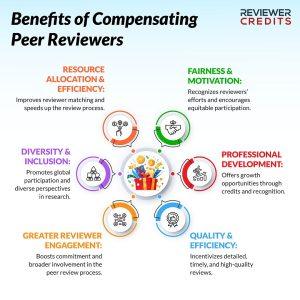Peer review ensures scientifically sound research, makes money for publishers, and gatekeeps researchers’ reputations and livelihoods. It’s a critical, indispensable step in the publication cycle, yet peer reviewers typically get paid nothing. Not a cent, euro, or yen. BUT…
There are a few exceptions and alternative forms of compensation.
It’s a loaded topic that makes more sense when you consider the background, so we’ll get into it here. Moreover, there are actually ways that peer reviewers can be “paid” for their invaluable efforts, and many peer reviewers don’t know about them. We’ll go over those, too. One of them is still a bit of a hidden gem!
Factors behind peer review (non-)compensation
Behind the lack of compensation for peer reviewers is a range of sometimes complex factors in academic journals’ policies and platforms.
Tradition and voluntarism
The tradition of unpaid peer review is deeply rooted in academia. The modern form of peer review started around the 1970s as an assigned duty, on paper, by mail, and even handwritten. Scholars became peer reviewers as a voluntary service to advance their field. Many researchers still see peer review as part of their contribution to the scholarly community rather than as a remunerable job.
Peer reviewing is a means of giving back to the academic community. Researchers benefit from the peer review process when their own work is reviewed and published, and they reciprocate by reviewing others’ work. This cycle of voluntarism is ingrained in academic culture. That sentiment makes the idea of paid peer review, at best, questionable and, at worst, unethical and unthinkable.
Ethical concerns and conflicts of interest
Introducing monetary compensation for peer reviewers can raise ethical concerns. Would financial incentives influence review outcomes? For example, if a reviewer is paid per review, won’t they want to finish faster and with less rigor? Will they be more inclined to reject a manuscript if they get paid less or nothing for a second review?
Maintaining the integrity and impartiality of the peer review process is crucial, and monetary compensation could threaten these values. Unscrupulous or colluding reviewers might also “stack the deck” in favor of certain authors or findings if they’re paid. Granted, though, favoritism/bias may be just as present in the voluntary system. Nevertheless, a bit of cash could further move the needle.

Peer review is steeped in tradition, but not compensation
Resource allocation and budget constraints
Many academic journals work with limited financial resources. Non-profit journals and those with a small readership often struggle to allocate funds for the review process. So, while prestigious journals might have the resources to offer honoraria or other incentives, smaller or niche journals may not have the financial flexibility to do so.
Editorial and production costs naturally take precedence. Reviewers’ goodwill enables the journal’s scientific rigor and credibility, as well as its very existence. Paying reviewers isn’t even a consideration.
Of course, this isn’t the case for major publishers and journals. And some contend that they’re turning such great profits that they should pay some of that back to the voluntary peer engine keeping them running.
Open access (OA) journals, which rely on article processing charges (APCs) for funding, might have more financial flexibility than conventional subscription-based journals. However, if review compensation means increasing APCs to cover the cost, this might be passed on to authors. So, is that really a net gain? One way or the other, researchers are footing at least part of the bill.
Implementing a system for compensating reviewers may come with additional administrative costs. Journals would need to develop mechanisms for tracking, processing, and distributing payments, which would add to their operational expenses. This financial burden can be particularly challenging for journals with limited resources.
Quality and motivation
While compensation can boost reviewers’ motivation, it might also lead to undesirable consequences. Reviewers might prioritize speed over quality to secure payments, resulting in less thorough reviews. Introducing financial rewards could shift the focus from altruistic service to personal gain, lowering the overall quality of peer review.
The pressure to complete reviews quickly for financial compensation could lead to reviewer burnout. The academic community already faces challenges with reviewer fatigue, and the added incentive to take on more reviews for payment could exacerbate the issue, affecting reviewers’ availability and performance, not to mention their own research and other duties.
The amount paid for review may be the ultimate arbiter
Does competition arise for the highest-paying review jobs if paid review is mainstreamed? And if that happens, do reviewers from wealthier nations again gain an unearned advantage?
The amount, whether monetary or other compensation, should then be enough to provide recognition but not so much that it imbalances reviewer representation and quality. Reviewer Credits takes the middle road here, offering non-monetary compensation and recognition instead of a specific monetary amount. What do you think of this solution?
Benefits of compensating peer reviewers
Compensating peer reviewers can offer numerous benefits, improving the quality and efficiency of the peer review process.
Resource allocation and efficiency
Streamlined and effective peer review requires efficiently matching reviewers with manuscripts that align with their expertise. Platforms like Reviewer Credits facilitate this matching process by having a ready database of reviewers and providing incentives to keep the reviewers engaged and motivated. This incentivization leads to higher quality reviews, while the reward is enough to encourage but not too much to distract.
Streamlined reviewer matching benefits the reviewers and the journals. Reducing the time and effort to find suitable reviewers lets journals expedite the review process, improve the quality of feedback, and often speed up the overall publication timeline.
Fairness and motivation
Providing fair compensation acknowledges the time and effort that reviewers invest in evaluating manuscripts. Monetary payments, honoraria, or other incentives can validate their contributions, motivating them to continue participating in the peer review process. Reviewers who feel their work is valued will likely be more diligent and thorough in their assessments, leading to higher-quality reviews.
Compensation also helps address the imbalance between the workload and the rewards of peer reviewing. Reviewers, especially those early in their careers or from under-resourced institutions, may find it challenging to devote time to reviewing without some form of compensation. Fair remuneration can make peer reviewing more accessible and equitable, encouraging a diverse pool of reviewers.

Professional development
Non-monetary compensation, such as the credit system offered by platforms like Reviewer Credits, can advance a reviewer’s professional development. The credits can be redeemed for academic courses, conference registrations, and other professional activities so that reviewers can develop their skills and knowledge. They can also access training and tips for free. This form of compensation aligns with researchers’ long-term career goals, providing them with valuable growth opportunities.
Professional development benefits also extend to the recognition provided by platforms like Web of Science Researcher Profiles. Documenting and verifying peer review activities can enhance a researcher’s academic profile, improving their visibility and credibility in the scholarly community. This recognition can lead to promotions, funding awards, and other such opportunities.
Quality and efficiency
Financial or non-monetary rewards can incentivize reviewers to provide more detailed, thoughtful, and timely feedback. This higher quality of reviews contributes to publishing higher-quality research, benefiting the entire academic community.
Another big benefit is efficiency in the peer review process. Platforms that offer compensation, whether monetary or through credits, can streamline the process of matching reviewers with suitable manuscripts. By reducing the time and effort required to find willing reviewers, these platforms help expedite the review process. This efficiency is crucial for journals facing increasing submission volumes and can lead to faster publication timelines.
Greater reviewer engagement
Compensation can boost reviewer engagement, whether through direct payments, honoraria, or credits. Reviewers who feel appreciated and rewarded for their work are likelier to stay committed to the peer review process. This sustained engagement is essential for maintaining a robust and reliable peer review system, especially as the demand for high-quality reviews grows.
Engaged reviewers are also more likely to participate in additional review activities, such as mentoring early-career researchers or contributing to special issues. This broader involvement can further enhance the academic community, fostering a culture of collaboration and continually improved research quality.
As we examine the challenges and controversies surrounding peer reviewer compensation, we must weigh the benefits against the potential drawbacks to develop balanced and sustainable compensation models.
Diversity and inclusion
Yes, we’ve seen this one already. While compensated peer review may reinforce gender gaps or North–South gaps, it can also narrow them. Especially if operated through a centralized system, reviewers from around the world can register as reviewers irrespective of their sociodemographics. They don’t have to wait for an invite; they can make themselves known. This way, reviewers are all on the same playing field.
This approach can broaden the pool of reviewers, incorporating diverse perspectives and expertise. That can only enrich the quality and relevance of reviews. A more inclusive scholarly community is a widely shared goal, as it should be.
Peer reviewer compensation platforms
Compensation remains limited to several platforms and a handful of journals and publishers. It’s a mix of token monetary amounts and other forms of compensation such as submission discounts and “credits” for useful items and services. The main ones are as follows:
Axios Review
Axios Review compensates expert reviewers for their detailed feedback on manuscripts, focusing on providing constructive insights. However, the specific amounts aren’t disclosed on their platform.
Reviewer Credits
Reviewer Credits offers a comprehensive credit system where reviewers earn credits for their review activities. These credits can be redeemed for various services such as conference registrations, academic courses, publication fees, and charitable donations. This system emphasizes professional development and global recognition rather than direct monetary compensation. Congrats, you’re here already. Click here to get started.
Web of Science Researcher Profiles (formerly Publons)
Web of Science Researcher Profiles let researchers track, verify, and showcase their peer review and editorial activities. The platform offers non-monetary rewards rather than direct monetary compensation. Reviewers receive recognition and documentation of their contributions, raising their academic profiles and credibility.
Research Square Research Quality Evaluations
Research Square provides a structured paid peer review service called Research Quality Evaluations. Reviewers receive a $50 honorarium (as of this writing) for their work through the service. Research Square maintains a pool of qualified reviewers and can supply reviewers on demand. However, this service appears to lack the ability to know the reviewer and to recognize them individually for their efforts.
Other journals and platforms
Collabra: Psychology, an OA journal, has a novel approach. It compensates peer reviewers by allocating part of the APCs to a research community fund. This fund is used to pay reviewers, aiming to balance the need for compensation with the sustainability of the peer review process. This model ensures that reviewers are rewarded while maintaining the journal’s financial stability.
Several other journals and platforms also offer compensation models. The American Economic Review had paid reviewers $100 for timely reviews, though it’s unclear if this policy still exists. The Lancet offers small honorariums for fast-track and statistical reviews. BMJ’s open access journals provide discounts on future publication fees for reviewers (and the publisher has a 100% waiver program on APCs for qualifying authors).
With medical publisher MDPI, for every manuscript reviewed, reviewers can receive a discount on their article processing charges when they next submit with MDPI (a win for the publisher, too). If the article isn’t accepted, the voucher can be used for a future submission.
All are viable and progressive approaches, which are dearly needed. Their efficacy is an ongoing topic.

Compensated reviewer = happy reviewer?
Balancing the scales with Reviewer Credits
Ultimately, the issue of compensation for peer review is a complex one, with no one-size-fits-all solution. It’s important to balance recognizing the value of reviewers’ time and expertise and preserving the integrity and impartiality of the peer review process.
While monetary compensation may not be feasible for all journals and conferences, finding creative ways to acknowledge and reward peer reviewers is essential. One solution is Reviewer Credits: A combination of incentives, recognition, and clear certification for peer reviewers. Our goal is to create a fair, sustainable, and inclusive system, where researchers are motivated to provide high-quality reviews without undue burden.
The question of why peer reviewers are often not paid raises important issues about equity, recognition, and the sustainability of the peer review system. As the academic community grapples with these challenges, engaging in thoughtful discussions and exploring innovative solutions is crucial to ensure that the peer review process remains robust and serves the best interests of science and scholarship.
